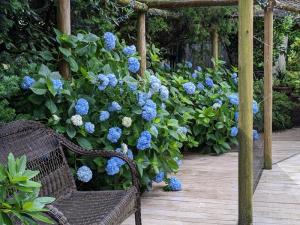Mill Pond Garden to feature flowers that flourish locally June 5
Mill Pond Garden will host an open day from 10 a.m. to 12 p.m., Sunday, June 5. A ticket admits one car and all occupants. To make a reservation, go to millpondgarden.com.
Features will include June’s best flowers for Cape Region gardens – hydrangeas, iris, clematis, roses, daylilies, honeysuckle, ground orchids, mountain laurel, banana shrub, many perennials and flowering native plants. A new introduction will be a special garden displaying tropical epiphytes, plants that grow on tree branches.
The epiphyte garden includes bromeliads, orchids, Spanish moss, staghorn and rabbit foot ferns, tillandsias, mosses and liverworts. Epiphytes, also called air plants, are any plant that grows upon another plant or object merely for physical support, having no attachment to the ground, getting nutrients from air, water and rotting debris or dust that falls into the area of their sparse roots or into their cup-shaped leaves. Epiphytes are not parasitic on the supporting plants. In tropical jungles, the upper branches host whole gardens of species that grow there for the habitat and more available sunlight. Most of these plants are angiosperms, meaning flowering plants, and some are very beautiful. Many examples, especially orchids and bromeliads, are available in local nurseries and garden centers. They can be kept in indoors in bright indirect or partial sunlight as houseplants in winter and put out for summer to reinvigorate themselves with the warmth and humidity in the garden, patio or porch.
One of the chief purposes of a public garden is to show local gardeners what plants can do well in their area and to provide how-to information. Unusual garden plants can be a surprise and delight in any garden. Using some showy tropical plants mixed into the home garden can change its tone to vacation tropical, especially with large-leaved tropicals like the red Thai banana or hardy banana, taros, colocasia, hardy needle palm or hardy fatsia, which add drama and/or color to the landscape.
One lovely surprise is the amaryllis, a spectacular flowering bulb often grown for a Christmas decoration, usually thrown out after blooming. The amaryllis can instead be planted nine inches deep and will thereafter bloom every year and increase over time, just like perennial daffodil bulbs. Plant in a well-drained site with partial sun for reliable success.
Fatsia japonica is another little-known garden wonder. The deer might nibble on Fatsia, but they usually don't devour it. This evergreen shrub adds dimension to a shade garden with its big, broad leaves in both variegated and non-variegated types, and dramatic clusters of white flowers in winter.
Hakonechloa aurea, Japanese forest grass, is a deer-resistant ornamental grass that takes shade and is not invasive. It is a beautiful yellow-green with a wonderfully arching rounded shape to about 18 inches high. The leaves are wide enough to catch light breezes that make the mound move gracefully. They are hardy enough to make great potted plants or can be used for bordering a bed.
Two other plants for being unusual, locally hardy, beautiful, non-invasive and problem solving with shade tolerance and deer resistance are saxifrage stolonifera (strawberry begonia) and Illicium Florida (anise shrub). Strawberry begonia, a popular houseplant, can also make a wonderful ornamental ground cover with white spring flowers for shady areas, especially near surface-rooted trees or under shrubs. Illicium Florida, the anise shrub, is an evergreen native and has a showy, yellow-leaved variety with red stems growing to about eight feet over time; it smells wonderfully of licorice and is also not bothered by deer.
Mill Pond Garden is a nonprofit pubic botanic garden on Red Mill Pond dedicated to holistic gardening, promoting wildlife, using mostly native plants, carbon-farming practices and promoting enjoyment of beauty year-round.
























































